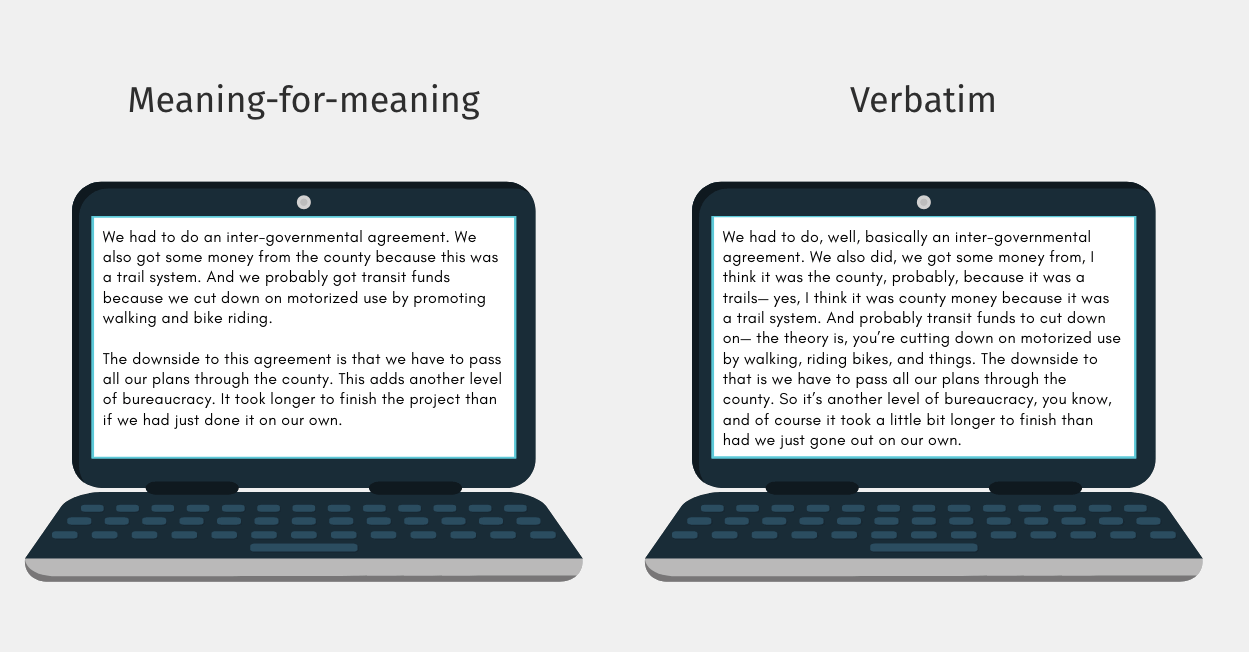
Do you coordinate accessibility services for students in higher ed? Do you advise students with hearing loss, autism, traumatic brain injury, or language processing disorders? If you’re looking for an advanced speech-to-text accommodation for students with diverse communication needs, TypeWell is easy to implement, simple to maintain, and highly cost-effective.
5 Reasons TypeWell is a great choice for higher education
Whether your role is in accessibility services or academic counseling, if you’re reading this, you know that students’ equal access to classroom communication is vital to their success. Your university and college students—especially those with hearing loss, autism, auditory processing disorder, and other communication needs—can benefit greatly from TypeWell. Here’s why:
1. Expertise
TypeWell was intentionally designed for the university setting, with over 18 years training educational transcribers to work in post-secondary institutions. In that time, TypeWell has honed the best techniques and tools to support equal access in higher education.
Note: TypeWell is not merely a software product. It is a professional language service performed by skilled providers and facilitated, in part, by the use of specialized text expansion software. It does not utilize automated speech recognition (ASR). If you’re looking for a “one and done” software product (i.e., you want to buy a device or program and leave it for a student to manage long-term), TypeWell is not for you. TypeWell does provide advanced, regularly-updated software but it is licensed only to transcribers systematically trained to use it for empowering students with live communication access.
In this way, TypeWell’s competence in higher education is comprehensive. Not only does TypeWell leadership hold nearly two decades establishing expertise in the market, but the transcribers paired with students are highly qualified. TypeWell transcribers complete rigorous, systematic, and thorough training. And TypeWell, as an organization, is deeply invested in keeping transcribers up-to-date on best practices, ensuring that they have opportunities to continue their professional development and serve your students successfully over time.
2. Flexibility
Your college or university is one of a kind, and so is each one of your students. Give your students and your higher education team plenty of room to discover the right accommodations.
For students
It’s vital to provide options to students who seek support with classroom communication. What works best for them? Allowing students to test out the tools they’ll rely on will lead to better outcomes. For this reason, TypeWell offers up to 2 hours of free transcribing to prospective students, which can be used in one longer class or multiple sessions.
Every student has different needs, often influenced by their area of study. For students in STEM or disciplines with specialized vocabulary, real-time access to lectures and presentations in the right technical language is essential. A verbatim service is not the only option for jargon-heavy materials—TypeWell’s dictionary contains over four million words and is updated regularly. And in fact, keeping up with a word-for-word transcript full of technical vocab is often more challenging than a condensed, meaning-focused TypeWell transcript.
For coordinators
TypeWell’s number one goal is to match your school up with the right strategy for implementing communication access services. You can (and should) get your feet wet and see what students think before making a big commitment. Pricing is customized and flexible, plus students can try the services for up to two hours free.
There are multiple options for using TypeWell, depending on your requirements and goals:
New to transcribing or looking to accommodate a single student? Contract with an experienced professional.
Looking to expand your program without hiring more contractors? Recruit and train transcribers for your unique needs.
Looking for a cost-effective alternative to CART services? TypeWell can train to hire—we’ll do the interviewing and onboarding.
3. Legal compliance
Your school needs to comply with accessibility laws. In fact, institutions of higher education are increasingly the target of class action lawsuits focused on accessibility.
In the United States, three federal laws specifically pertain to transcription services: the Americans with Disabilities Act (ADA), Section 504 of the Rehabilitation Act of 1973, and the Individuals with Disabilities Education Act (IDEA). This article provides further detail on each of these laws.
In 2004, a revision to IDEA was approved in which TypeWell was specifically identified by Congress as a transcription service that meets the definition of interpreting services. It was further determined that TypeWell should be considered as an effective tool to meet the communication access needs of students with disabilities [Section 300.34(c)(4)].
4. Real-time access
True communication access means equal access. And giving students a copy of someone else’s notes after a class is not equal access. TypeWell transcribers are trained to facilitate real, two-way conversation, so students can actively participate in the moment, live, as a discussion unfolds. Everyone benefits from real-time accessibility—the student benefits from their teachers and peers, and their teachers and peers benefit from the student’s increased participation.
TypeWell transcribers provide meaning-for-meaning access, as opposed to word-for-word transcripts. Meaning-for-meaning transcribing facilitates student comprehension in several ways:
- Improved readability. Wording and grammar are condensed for clarity. Transcribers use paragraphing and clear formatting to reduce eye fatigue and improve real-time understanding.
- Non-verbal cues. TypeWell transcribers convey non-verbal information such as a speaker’s emphasis, meaningful pause, tone, or body language, so students have equal access to nuanced communication.
- Lasting value. Students receive each transcript after class to use as a study tool, which contains a valuable layer of human editing already built in.
5. Convenience and value
The fact that transcribers provide a meaning-for-meaning transcript after class, free of charge, is just one example of the utility and value TypeWell includes. Another proof point: on request, transcribers will bold important information for students. Information like, “this will be on the test,” or “no class Friday,” can be emphasized to ensure everyone is on the same page. This also makes it easier for students to skim through the transcript after class and quickly glean the most important information.
The humans behind TypeWell are dedicated to matching your university with the services that will serve your students best, even if those services aren’t provided directly through TypeWell. Our team will happily get on a call to understand your unique program needs and help you select the best fit among available services. There are lots of ways to try TypeWell out so your students can experience the difference, including a free product tour and free trial.
Schedule a live demo
Join hundreds of colleges and universities that have relied on TypeWell to offer their students equal communication access. Or start by finding out more. TypeWell is here to help.



